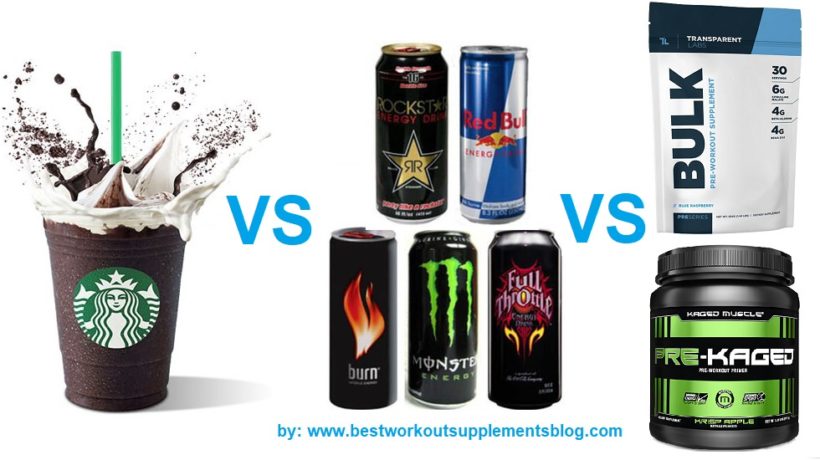Feeling too tired to work out? You’re not alone.
The majority of gym goers struggle with no energy to workout, and battle mentally just to show up.
After all, there are so many other pressing responsibilities, and the gym is a silent one!
So, is there anything you can do to get more energy? You know, besides the whole ‘sleep 8 hours, eat tons of vegetables, meditate, and blah blah blah’?
Yes, there is.
The question is: should you, is this even healthy, and which should you drink before a workout?
Here we’re going to compare:
- Drinking coffee before workout
- Energy drinks before workout
- And pre-workout supplements
Spoiler alert: pre-workouts are top dog.
How to get energy to workout: caffeine!
The whole point here, is to get more energy to workout; and caffeine is the one thing that coffee, energy drinks, and pre-workouts have in common.
The type of caffeine often varies though:
- Coffee’s caffeine is ‘natural caffeine’
- Energy drink’s caffeine is often caffeine anhydrous or guarana derived
- Pre-workout caffeine can come from a limitless variety
You’re also going to need to consider:
- Total caffeine content
- Added sugar
- Additional active ingredients
- Artificial ingredients like sweeteners and preservatives
Based on this, we’re going to compare for you the effects of drinking coffee, energy drinks, or pre-workouts before exercise.
Drinking coffee before workout:
Drinking coffee has always been the most direct and popular way to increase energy via caffeine.
So it’s really no surprise that coffee is a popular pre-workout drink.
Though, how do we quantify coffee’s effect on exercise?
The majority of research has concluded that drinking coffee is net-positive for improving athletic performance (3)(4).
Caffeine rich coffee appears to work by stimulating the parasympathetic nervous system (5). This improves the quality of commands you send to your muscles.
The result of coffee consumption before exercise is:
Coffee consumption also appears to negate the occurrence of post exercise hypotension (8), the significance of this is to-be-determined.
Clearly, coffee is great.
However, it seems like the caffeine present in coffee is doing all the heavy lifting (9)(10), claiming equal credit for the above benefits (11).
Energy Drinks before exercise:
Like coffee, energy drinks are commonly used as exercise and performance aids. However unlike coffee, energy drinks can often contain excess sugar, preservatives, co-stimulants, and other cautionary ingredients (12)(13).
Bad ingredients aside, how do energy drinks perform?
Overall, positive.
Though like coffee, most of these benefits are directly attributed to the caffeine content itself.
Coffee Vs Energy Drinks
In coffee, the caffeine is as natural as it gets, and there really aren’t too many ‘unknown’ or questionable ingredients.
Energy drinks on the other hand contain several ingredients, as well as most of the ‘bad stuff’ you’ll find in sodas. The only extra perks are great taste and standardized caffeine.
Taurine in energy drinks – what’s the deal?
Taurine is a natural compound that has several roles in the body (17).
Energy drinks often include taurine for an energy increasing effect, and due to this the ingredient has fallen under scrutiny (18).
Though we don’t see any reason to be concerned about taurine in particular, when artificial ingredients and excess caffeine dosages are so prevalent.
Which leads us to our last category, pre-workout supplements.
Pre-workout supplements before exercise:
Like coffee and energy drinks, pre-workout supplements contain enough caffeine to get you going mentally and physically.
The key difference however, is that pre-workouts are specifically designed to be taken before exercise, with coffee and energy drinks as a template.
The latter two are not specially focused.
Pre-workout drinks contain:
- Standardized caffeine dosages
- Strength enhancing ingredients like creatine
- Circulation enhancing ingredients like l-citrulline malate
- Endurance promoting ingredients like beta-alanine
And the list goes on. All of which, you’re really not going to get out of energy drinks or coffee.
This has lead to several positive-outlook studies on a variety of different pre-workout supplements (19)(20)(21).
But don’t get it twisted; not all pre-workouts are great.
We’d know too, the majority of BWSB is composed of exercise enhancing supplement reviews, ingredient analysis, and rakings.
While we’ve taken a lot of great pre-workout supplements, we’ve also wasted money quite a bit.
Its not uncommon for a pre-workout to suck, in fact many of them do.
It all comes down to under-dosing, and disguising the under-dosing through proprietary formulas.
What that means is, they say an ingredient is included, when really only a tiny, tiny amount of it is there.
But hope isn’t lost… You just need to have an idea of what you’re looking for.
What to look for in a pre-workout supplement
Good pre-workouts do exist. We’ve taken plenty of them!
To find a quality pre workout, look for:
- 150-250 mg caffeine
- 6,000 mg l-citrulline malate
- 3,200-4,000 mg beta-alanine
- and other specialties like BCAAs
We cover all this and more in our guide to what pre-workouts do.
Wrapping up our comparison between coffee, energy drinks, and pre-workout
If you’d like, you can totally take coffee or energy drinks before working out. There isn’t anything wrong with your selection if you are looking for more energy.
However, if you’d like the best experience possible, as well as more specialized performance enhancements – then its time you learn about pre-workout supplements.
Either way, keep hitting the gym, eat healthy, and sleep well – good results will begin to form in no time!
